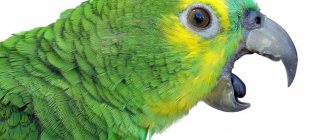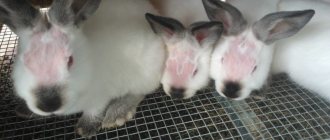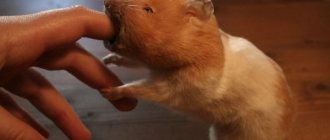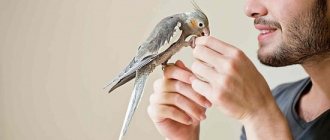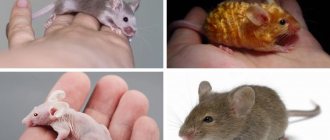Livestock » Ferrets
0
1608
Article rating
Kira Stoletova
Ferrets have long been transformed from wild predators into domestic pets. These small animals are kept in some homes like cats. The ferret catches mice, loves to play with people and can be trained to go to the litter box. But even the domesticated ferret breed, the ferret, is capable of biting or scratching its owner. In a single case, such behavior is not scary: the animal could simply experience a nervous shock and begin to defend itself. But how can you stop a ferret from biting if this has become the norm for a predator?
How to stop a ferret from biting
In this case, the cause of the aggression should be determined and a set of disciplinary measures should be taken. But at the same time, remember that you cannot punish the animal: ferrets are very vindictive, but they are still predators, albeit small ones.
Features of behavior of ferrets
Most often, the reason why a ferret bites is natural instincts. With the help of their teeth, cubs explore the world and learn to defend their territory.
The games of young horet in their natural habitat may seem harsh, but this is how they acquire hunting and self-defense skills. Aggression increases in young predators due to a surge in hormones. This usually occurs in the first month of their life. You should not get a second animal during this period of the ferret’s life: the young animals can cause real carnage. Adults can also show aggression, but in smaller numbers.
The male bites the female's withers during the hunt. Also, directly during mating, the ferret firmly holds the female by the withers with his teeth. In this place, the skin of predators is structured like that of cats, and strong bites do not harm them.
These animals prefer to kill their victims with a quick and powerful bite to the neck, so if a predator tries to grab an arm or leg or attacks from an ambush, it means that he sees you as a victim. Such behavior should be corrected immediately, otherwise the animal will have to be kept exclusively in a locked state.
Other reasons for ferret bites may include:
- active games that awaken hunting instincts in the animal;
- a change of scenery;
- distrust of strangers;
- struggle for power over territory.
Typically, the domestic ferret does not bite often, since this breed was specially bred to coexist peacefully with humans. But it should be remembered that even ferrets had wild predators as their ancestors, so natural instincts sometimes take over the animal.
Many people mistakenly believe that it is impossible to stop a ferret from biting at home, since the animal does not have intelligence. However, it is not. These predators are social animals that understand a lot. To wean an animal from showing aggression, a special set of measures should be taken, depending on the cause of the bites.
Causes
There are actually many reasons why a ferret bites. All of them can be adjusted over time.
The animal is afraid of a new environment
Moving to a new habitat is always stressful for an animal, and ferrets are no exception. The reaction to a new apartment and people can be the most unpredictable: fear, a desire to hide, aggression, a desire to bite.
Anger in this case has no meaning, it is simply a desire to demonstrate the ability not to be offended. This is the case when no action needs to be taken; the time required to get used to the new place must pass.
Important! Having recognized the friendly attitude of others, kindness and care, the ferret will gradually calm down and begin to behave more friendly.
Ferret is afraid of humans
Overcoming fear of people is the most difficult thing, especially if it is an adult animal that has never seen anything good from a person. Sometimes it can take a long time for a ferret to develop trust.
Fear of people is manifested by hissing, squealing, and fluffy fur. Punishment in such situations is prohibited; this will only make things worse. Negative emotions can only be smoothed out with patience, affection and kindness.
During this period, it is better to place the ferret in a room where as few people as possible will be present, to ensure a calm environment. Of course, it is advisable to keep a wild animal in a cage and equip it so that the ferret can hide in it.
You can let the ferret walk around the room for a while, observing the behavior from the outside. Starting from about the third day in the house, you can try to gently pet the animal. If it is not aggressive, you can even play with it. First, toys are used for this, this will avoid bites. Only when the animal gets used to it and begins to trust the person, you can start picking it up.
Ferret checks
Often, once in a human home, an animal conducts a kind of check. The ferret needs to understand who the person is and how to behave with him. Having no further means to check this, the ferret resorts to biting.
In this case, weaning an animal from a bad habit is quite simple. Clear words that are repeated over and over again will help, for example, “No.” It is also necessary to make it clear to the ferret that his bites cause pain. As soon as the animal bites, you need to sharply withdraw your hand and loudly say “Ouch.”
Other reasons
A ferret may bite for the following reasons:
- The ferret exhibits a predatory instinct. This should be kept in mind at all times. This manifests itself when an adult animal that has managed to live in the wild is brought into the house.
- The animal is in pain. At such moments, aggression can manifest itself, it is expressed in the desire to bite.
- The animal has entered the rutting period, at this moment the males stand out - they become more aggressive and can bite.
Methods for adjusting animal behavior
Do domestic ferrets bite? The first thing to note is that even in the wild, ferrets do not bite all the time.
In childhood, they are taught to calculate the strength of their bite by the female, who can firmly pat the puppy by the withers for bad behavior. In a home environment, this should be done by the pet owner or breeder. The animal can inflict its first serious bites after 4 weeks of life. Before this, the puppy’s jaws are still very weak. When a predator is one month old, its teeth are already quite sharp and its oral muscles are strong.
The animal may not realize that it is clenching its jaw too tightly if this is not explained to it in time. In adulthood, it will be almost impossible to stop a ferret from biting. Animals on large farms or with inexperienced owners can often show aggression because they were not taught how to behave in the first months of life.
Before you stop a young ferret from biting, you should determine the cause of the behavior, since the methods for correcting the behavior vary. In some situations you should give a stern reprimand, in others you should show affection.
The most important thing is consistency
Remember to repeat these steps all the time if your ferret bites. Only if these conditions are met will you achieve success. And your pet will remember that if he bites, the game will definitely stop.
How to stop a domestic ferret from biting, what other measures can be taken? The method using “yummy” food for the animal is considered very effective. Simply put, whenever an animal does not bite during play, reward the pet with something tasty (for example, meat). Just don't overdo it. The piece should be small, otherwise it will not have the best effect on the digestion of the “scamp”.
Active games
The most common cause of biting is the ferret being excited and playful. Even domestic breeds love to hunt rodents, so active play can awaken the animal's predatory instincts.
This manifests itself as a constant attempt to jump on a person, attack from the side, or jumping in one place with a grunt. This is how young ferrets play with their relatives and try to play with their owner, in whom they see a parental figure.
How to stop a ferret from biting if the cause is agitated behavior? In this case, the methods of influencing the animal look like this:
- stop the game by loudly saying the word “No” or “No”;
- stop paying attention to the ferret for a while;
- put the animal in a cage for half an hour to calm it down.
Usually, these measures work well on young ferrets, allowing the naughty baby to come to its senses. If the animal continues to be aggressive, then you can lift it by the withers and shake it slightly. For a ferret, this procedure is harmless, but in a similar way, the female will calm down active cubs, and her instincts will take effect.
Under no circumstances should you hit or throw an animal. This can cause the ferret to become embittered and seek revenge. It’s better to hold him by the scruff of the neck for a few minutes and give him a stern lecture. A measured voice will calm a raging pet well and make it clear that it is better not to do this. If you are afraid of harming your ferret with such disciplinary actions, then watch the training video.
How to toilet train?
Puppies quickly become toilet trained. Raising adults is more difficult. It is necessary to know some physiological characteristics of animals. They defecate within 15 minutes. after waking up.
This point must be taken into account and take the puppy to the litter tray. In 3-4 days he will understand why the container was installed in the cage
Ferrets are released into the room for walking after they have settled into the tray. Otherwise, he will find a toilet in some corner of the room. If this happens while walking, the area is washed and irrigated with a product with a pungent odor.
Unfortunately, these measures do not always help. If the animal defecated once in the room, then it is easier to put another tray in this place. It will be difficult to retrain the animal:
- They advise you to take a piece of droppings and take it to the tray;
- the pet will look for a place to toilet and smell the smell from the container;
- in it he will perform the act of defecation.
It is recommended to take from breeders individuals who are trained to go to a certain place. When raising a ferret, you need to be patient.
Change of habitual environment
In the first days after purchasing the animal, the ferret may experience nervous shock and react aggressively towards the owner. The animal is not yet accustomed to new smells, so it should be left alone for a few days and allowed to get used to it.
In this case, the manifestation of aggression is not a threat to the person. This is the animal’s self-defense mechanism, which works in any unclear situation.
If the animal is nervous, it is better to let it come to its senses. During feeding and playing, you should call the animal by name and talk to it affectionately.
After a couple of weeks, the animal will get used to the new living conditions and will not bite. Sometimes the ferret shows aggression when the situation changes. For example, during renovations or simply moving furniture. This is also a natural process for the animal: in nature, pets are extremely jealous of their burrows and do not tolerate change. You can distract the predator with tasty food or a new toy.
Attack from around the corner
Sometimes a ferret can attack the owner or other household members and bite the legs on the sly. This is something different than biting your hands while playing. This is a bad habit. It is urgent to get rid of it, but it is not too easy.
It is recommended to use one method. You need to stock up on two sprays; they can be purchased at pet stores. One should have a bitter taste that is unpleasant for the ferret, the second should be sweet, which can be used as a treat for the animal.
Feet should be sprayed with bitter spray. When the ferret tries to bite, it will be unpleasant for him. Immediately after the incident, apply a sweet spray to some area of the body (for example, the palm) and offer the ferret to lick it. It is important that the animal feels the contrast, then it will gradually come to understand: biting is unpleasant, bitter, but if you lick it, you can feel a pleasant taste. Gradually, the ferret will wean itself from biting its legs.
Fear of man
If the ferret does not trust its owner, you should be patient. You need to monitor the behavior of the animal: if the animal often screams, jumps into the far corner of the cage, or has a fluffed tail, the animal is afraid of you.
It is possible to gain your ferret's trust, but the process will take some time. First of all, the conditions of detention should be reviewed. Animals do not tolerate loud noises and strong odors very well. There should be no speakers, TV or radio near the cage. It is important to avoid spraying air fresheners near the predator’s home. Aggressive chemistry can cause a ferret to become nervous.
You need to gradually accustom your ferret to being handled. You should not make sudden movements or try to pick up the ferret against its will. First of all, you can start giving the animal food from your hands. This way the ferret will get used to the smell of a person more quickly. However, it is better to wear strong gloves in the first days, since the animal is still capable of biting an owner who is unfamiliar to it.
You need to comb and stroke the animal more often when it allows. Ferrets really appreciate being treated well. You should not punish the animal physically: if the ferret bit you out of fear, then punishment will only push him away even more.
You can lubricate your hands with a bitter infusion of herbs so that it is unpleasant for your pet to bite them. This method is often used by experienced breeders.
You should not constantly use gloves when working with animals. The ferret will get used to the fact that the skin does not feel pain and it will be almost impossible to stop him from biting.
What not to do, common mistakes of beginners
- Bit and got it in the nose. Yes, it also happens that after each bite the owner clicks the nose of his “offender” in the hope that because of this he will stop biting, as they say “they knock out a wedge with a wedge.” I would not recommend doing this, because... any exaggeration of the force of the click can cause injury and nosebleeds, because this is one of the most sensitive and weak points of the domestic ferret. You will not achieve anything with this method; on the contrary, the animal may lose trust in you, and such actions may anger it. Any use of physical force for educational purposes is unacceptable; in this way, you will raise an angry, distrustful and aggressive animal, and not a white and fluffy pet.
- The ferret bites - I'll wear thick gloves. Another common misconception. Will you be wearing gloves all your life when interacting with animals? What you need to look for is not resistance to the ferret's teeth, but, on the contrary, teaching him to use them with reasonable force. He won’t bite through thick gloves, maybe, but he will understand that no matter how hard he bites, he won’t cause you pain. But he can bite not only your hand, but also your heel (another favorite place), what then, will you wear felt boots?
Hierarchy of animals in the house
Sometimes ferrets bite hard if they want to compete for power, like dogs or cats. The pet has good intelligence and can test how far it will be allowed to go. Most often, such behavior can be observed in young ferrets from 3 to 6 months.
How to stop a ferret from biting if he is fighting for leadership in the house? An effective method against such behavior is a combination of punishments and rewards. If the ferret behaves well and reacts to prohibitions, then you should give him a treat or let him walk around the apartment. In case of increased aggression, the animal should be locked in a cage or shaken by the scruff of the neck.
The animal is afraid of people
If the biting is caused by the animal's fear, then getting out of this situation will be the most difficult. This usually happens in adults who were mistreated before coming into your home. Enough time must pass for the animal to trust you.
Signs that characterize fear: hissing, sharp squeals, fluffy tail. Never physically punish such ferrets as this will only make the situation worse. Only with patience and affection can you win the animal’s trust.
First you need to reduce the number of irritants, or better yet, remove them altogether. On the first day of your ferret's stay, take him to a quiet room where there are no children. The animal remains in the cage for now. To make him feel calmer, you can cover it with thick, “breathable” fabric, or simply place a ferret house inside it, where he can hide.
The next day, you can release the animal, but limit its space to one room, while you remain in the role of an observer.
And only on the third day, slowly begin to communicate with the ferret, try to gently stroke it, play with it. But first, play with toys that will help avoid animal bites. And only when the ferret gets used to such games, it will be possible to pick him up and play.
Consequences of a bite
First of all, it is worth noting that wild ferret bites are dangerous not only due to damage to the skin, but also due to the introduction of infections into the body. Rabies is considered the most serious disease. Without proper medical care, this infection is fatal. But you should also beware of pets. If you are bitten by a ferret, avoid the following:
- When the animal has already closed its mouth, do not try to slow it down. This will encourage the animal to tighten its grip.
- Do not offend your pet - you will only cause a wave of aggression in him.
- If you experience light bleeding after being bitten, do not stop it. Then foreign microorganisms are removed from the wound, which minimizes unpleasant consequences in the future (for example, infection).
- Do not bandage the wound too tightly, much less stitch it up.
- Any manipulations to disinfect and prevent damage should only be performed by a doctor.
A person bitten by a ferret requires immediate medical attention.
Next, let's find out what to do with a ferret bite before treatment:
- To get your pet to open his teeth, grab his nose with your fingers. If you have access to cold water, turn your pet off. If these methods don't work, insert a strong, blunt object into his mouth and loosen your grip.
- After being bitten by a vaccinated animal, it is enough to wash the wound and treat it with an antiseptic. If the damage is serious, consult a doctor.
- If you are bitten by a wild ferret, dissolve toilet soap in 0.5 liters of water and wash the wound for 5-15 minutes. An alkaline environment reduces the risk of contracting rabies.
- For superficial bites, lubricate the damaged area with an antibacterial agent and apply a sterile bandage.
- If you know the owner of the ferret that bit you, ask them what diseases the animal has been vaccinated against.
Toys
One of the teaching methods is to involve the animal in the game process. If the animal is engaged in an interesting activity, it will stop running after you and will bite your heels. But here you need to be careful when choosing the size and material of the toy. The child will definitely try to chew through it, so products made of rubber and other material that is flexible for his teeth will disappear. The ferret may swallow the bite, causing an intestinal obstruction. For the same reason, you shouldn't let him play with all the little things. Here are some good examples:
- Build tunnels for your pet. To do this, you can use pipes or boxes suitable for it. Ferrets love to explore burrows, so a complex system of movements will keep your pet occupied for a long time.
- Take a durable rattle or bell and wrap it carefully in a sock.
- If you have a soft toy made of high-quality non-toxic material, you can give it to your baby.
Your ferret will enjoy specialized toys available at pet stores.
As you can see, toys for ferrets are made by hand without much effort. You just need to use a little imagination. Keep your pet away from foods with strong odors or products from questionable brands.

